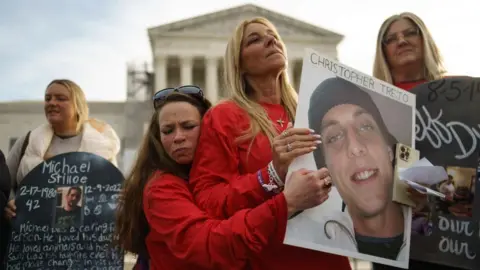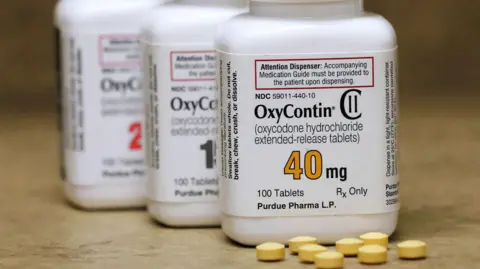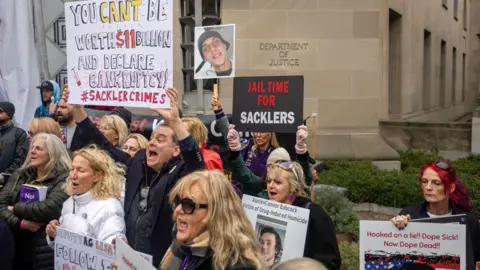from Natalie Sherman, BBC news
 EPA
EPAThe US Supreme Court has struck down part of the bankruptcy settlement to Purdue Pharma that would have shielded Sackler family members from future lawsuits over their role in fueling the opioid crisis.
The Sacklers, who owned and ran the Oxycontin maker for decades, had agreed to pay $6bn (£4.7bn) for a wider settlement in exchange for comprehensive protections against civil claims related to the addictive opioid.
But the country’s highest court ruled that granting such protections to the Sacklers, who did not declare bankruptcy themselves were not authorized by law.
Members of the Sackler family said they would continue to push for a settlement, warning that the alternative was “costly and chaotic legal proceedings in courtrooms across the country.”
The decision is a victory for the US government and others who had opposed the deal, arguing that the Sacklers’ release was an abuse of the system.
But it raises big questions about the future of the deal, which had won significant, if mixed, support from many who sued the company and saw it as the only practical way to reach the family’s billions in treatment. of drugs and other uses.
Ellen Isaacs, whose son Patrick Ryan Wroblewski died of an overdose in 2018 at the age of 33, was one of the family members who had opposed the shield for the Sacklers.
She said she wasn’t sure what would happen next, but hoped justice would be served.
“I would like to see them held fully accountable,” she said. “I’m so thankful for the Supreme Court right now that I can’t go any further than that.”
 Reuters
ReutersPurdue became a household name in the US as the manufacturer and promoter of OxyContin – a prescription painkiller that it promoted as safe despite being aware that it was highly problematic and widely misused.
The company filed for bankruptcy in 2019 after being hit by thousands of lawsuits filed by states, cities and families. He later pleaded guilty to criminal charges, including defrauding health agencies and making illegal payments to doctors.
The kind of shield afforded the Sacklers in this settlement has been a critical feature of other high-profile settlements, including those involving the Boy Scouts of America and the Catholic Church.
But courts have been split on whether to actually allow such “releases” from liability for third parties like the Sacklers.
In asking the Supreme Court to take up the case, lawyers for the US government said that upholding it would “leave in place a roadmap for corporations and wealthy individuals to abuse the bankruptcy system” and escape liability. .
Writing for a 5-4 majority, Justice Neil Gorsuch echoed those concerns.
“The Sacklers have not agreed to put anything close to their full assets on the table for opioid victims,” he wrote. “Yet they seek an injunction that would extinguish virtually all claims against them for fraud, intentional injury, and even wrongful death, all without the consent of those who have brought and seek to bring such claims.”
The court noted that the Sacklers, who have long denied wrongdoing, “seek to pay less than the code ordinarily requires and receive more than it normally allows.”
Oxycontin, often a precursor to stronger drugs like heroin, has been blamed for fueling the opioid crisis.
Since 1999, a few years after the drug became available, opioid overdose deaths have increased eightfold to more than 80,000 a year.
Court filings allege the Sackler family was aware of the legal risks and withdrew about $11 billion from the company in the decade before its bankruptcy. They hid much of the money overseas, using part of it to pay company taxes, making recovery difficult.
When the Supreme Court heard arguments last year, dozens of protesters opposing the deal showed up, holding signs such as “my dead son does not release the Sacklers”.
But many others had supported the deal, willing to accept the terms if the result was billions of dollars for treatment, as well as $750 million that would go directly to opioid victims, estimated at $3,500 to $48,000 each.
 Getty Images
Getty ImagesIn his dissent, Judge Brett Kavanaugh said the settlement was a “shining example” of the bankruptcy system at work.
“Today’s decision is wrong in law and devastating to more than 100,000 opioid victims and their families,” he wrote, warning that it would limit the ability of bankruptcy courts to provide “fair fashion and equitable relief.” .
Purdue called Thursday’s decision “heartbreaking” and said it would immediately return to resume negotiations.
Abbe Gluck, a professor at Yale Law School, said judges had been under “a lot of pressure not to stop this money from flowing to the victims.”
But she said the dispute had served as a “trial” for broader legal issues as more firms turn to bankruptcy courts – which have unusual power to centralize lawsuits and compel settlement – to resolve claims for massive errors.
She said the decision was a warning against this trend.
“The court is sending a signal of caution, I think it should have an impact on other pending cases,” she said, adding that the decision left open the possibility that bankruptcy courts could grant legal protections to third parties such as Sacklers, if consent is given. have been achieved.
Cheryl Juaire, the mother of two sons who died of an opioid overdose, who had helped negotiate the deal as a member of the creditors’ committee, said the prospect of further negotiations was “an absolute nightmare”.
“There is no win-win here. If the Sacklers go to jail, that would be justice for a lot of people, but it wouldn’t save lives,” Ms Juaire said.
But Judge William Nelson of Indiana, whose son died of an overdose in 2009 and who had opposed the settlement, said for him, the fight was not about money.
“I don’t care if we never see a penny like that,” he said.
He said he hoped to one day see criminal charges brought against the Sacklers.
“Our hearts go out to those who wanted the settlement, but we still feel strongly that this was the right decision,” he said. “It sends, or should send, a message to the Sacklers that they are not above the law.”
#Supreme #Court #rejects #plan #protect #Sacklers #Purdue #opioid #deal
Image Source : www.bbc.com
